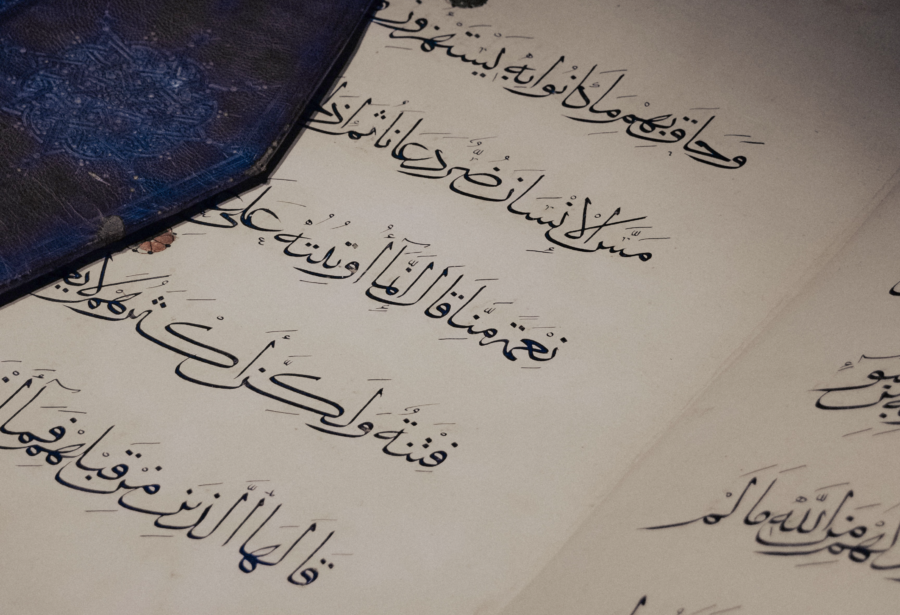There might be better ways to learn Arabic than traditional methods (such as studying grammar and morphology). The schools teaching languages as science have degraded because of language distortion.
The question is: (why do we teach our children Arabic?). We are going through this article series to mention three main reasons. The first one is because we are Muslims.
Islam will require that I get to know our Lord “Allah” through the revelation “Wahi” that the Lord revealed in the Arabic tongue, making it easier for them to understand its meanings.
We are not discussing the need to learn intonation-التجويد, diacritics-علامات التشكيل, or syntax-قواعد النحو. We mean understanding the explanation of the words-معاني الكلمات, context-سياق الكلام and what I should do based on my understanding of the verse or hadith.
Arabic is one of the most challenging languages to learn, perhaps because every single root (which consists of 3 letters) can produce dozens of meanings. For example, the word “حَرْف” can mean “alphabet letter-حرف أبجدي”, or it can mean “edge-حافة”, branch out to the definition of “distortion-تحريف” or “deviation from the destination-انحراف”.
Suppose a Muslim learns Arabic, which has these meanings in their diversity, differences, and interventions caught many purposes from just one to three or four letters. In that case, they will be able to reach the intended meaning of the revelation (Quran and Sunnah), and thus it will be easier for them to worship the Lord “Allah” even if they are Arab or non-Arab. As Muslims, they will need that much enough to do the main obligations-فرائض such as reciting Al-Fatiha or Al-Tashahud in the praying.
If we assume that a 12-year-old son of Arab origins knows how to read Arabic without much awareness, he recites the following verse without understanding what the word “حَرْف” exactly means here.:
(وَمِنَ النَّاسِ مَن يَعْبُدُ اللَّهَ عَلَىٰ حَرْفٍ ۖ فَإِنْ أَصَابَهُ خَيْرٌ اطْمَأَنَّ بِهِ ۖ وَإِنْ أَصَابَتْهُ فِتْنَةٌ انقَلَبَ عَلَىٰ وَجْهِهِ خَسِرَ الدُّنْيَا وَالْآخِرَةَ ۚ ذَٰلِكَ هُوَ الْخُسْرَانُ الْمُبِينُ (11))
(And of the people is he who worships Allah on an edge. If he is touched by good, he is reassured by it; but if he is struck by trial, he turns on his face [to the other direction]. He has lost [this] world and the Hereafter. That is what is the manifest loss) [Surah: Al-Hajj – Verse: 11 | Saheeh International Qur’an translation]
He does not know or see a bulk of words in such meaning, so the intended purpose of the verse will not reach him. Unless he needs a translation or uses an interpretation book, the meaning accuracy in Arabic differs from one language to another.
We see a non-Muslim worshipping our Lord by instinct-فطرة and in his attempts to understand the verses. You find him affected by the verses without realising the meanings because there are other components in the revelation that make him influenced by it, like emotions. Still, for these emotions to work with the soul much more, he needs to understand by explaining these meanings. But when our sons have a taste for definitions, as the old Arabs had, any text will be accessible for them to understand and utilise.
I was aiding a foreigner to recite and understand the Qur’an, he understood Arabic a bit, and I was trying to explain to him:
(إِذْ رَأَىٰ نَارًا فَقَالَ لِأَهْلِهِ امْكُثُوا إِنِّي آنَسْتُ نَارًا لَّعَلِّي آتِيكُم مِّنْهَا بِقَبَسٍ أَوْ أَجِدُ عَلَى النَّارِ هُدًى)
(When he saw a fire and said to his family, “Stay here; indeed, I have perceived a fire; perhaps I can bring you a torch or find at the fire some guidance.”) [Surah: Taa-Haa Vers: 10 | Saheeh International Qur’an translation]
I needed to explain to him most of the words of the verse: (امكثوا، آنست، لعلي، آتيكم، قبس، هدى) so that he can understand its meaning, and even understand other verses after that.
That is why we recommend learning Arabic through easy-to-medium texts of pre-Islamic Arabic poetry and prose-نَثر before reciting the Islamic religious texts to form the mentality of the old Arab people. That will enrich our sons’ Arabic tongue and mindset as much as the grammar techniques and morphology can do!
The Lord is the most known better than us-هذا والله أعلم.

0 Comments
Leave a comment